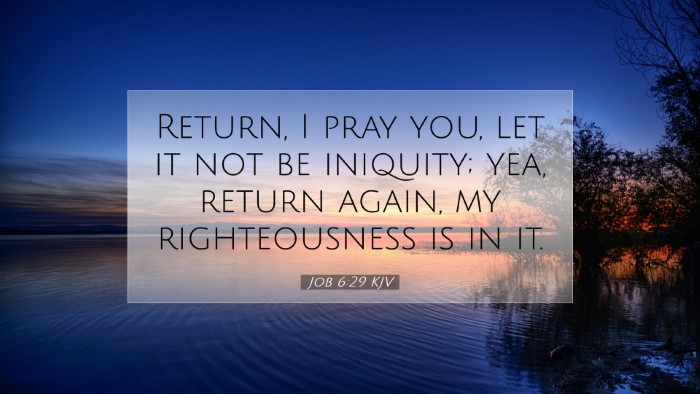Old Testament
Genesis Exodus Leviticus Numbers Deuteronomy Joshua Judges Ruth 1 Samuel 2 Samuel 1 Kings 2 Kings 1 Chronicles 2 Chronicles Ezra Nehemiah Esther Job Psalms Proverbs Ecclesiastes Song of Solomon Isaiah Jeremiah Lamentations Ezekiel Daniel Hosea Joel Amos Obadiah Jonah Micah Nahum Habakkuk Zephaniah Haggai Zechariah MalachiJob 6:29
Job 6:29 KJV
Return, I pray you, let it not be iniquity; yea, return again, my righteousness is in it.
Job 6:29 Bible Commentary
Commentary on Job 6:29
Verse: "Return, I pray you, let it not be iniquity; yea, return again, my righteousness is in it."
Contextual Overview
The Book of Job is a profound reflection on suffering, righteousness, and divine justice. Job, a man of exemplary integrity, is confronted with immense suffering, prompting him to express deep anguish and a yearning for understanding. Job 6:29 is part of a larger dialogue where Job pleads for understanding and urges his friends to reconsider their judgments.
Commentary Insights
-
Matthew Henry:
Henry emphasizes Job's appeal to his friends to return to the truth rather than persisting in their erroneous counsel. This verse underscores the weight of integrity and righteousness in Job's life. He seeks validation of his innocence not only from God but from those around him, showing the human need for companionship and support during trials.
-
Albert Barnes:
Barnes notes the significance of Job's call for a return to righteousness. He interprets the plea as a request for a fair assessment of his situation. Job fervently desires that his friends reconsider their harsh judgments and acknowledges that their accusations stem from a misunderstanding of his true character and the workings of divine providence.
-
Adam Clarke:
Clarke discusses the psychological and emotional turmoil that Job expresses in this verse. He rightly observes that Job's anguish is compounded by his friends' betrayal, who should have offered compassion instead of condemnation. Clarke points out the theological implications of questioning divine justice, indicating that Job, despite his suffering, clings to a belief in his righteousness before God.
-
Theological Reflections:
The plea for a return to righteousness is not merely a demand for affirmation but an invitation to a deeper understanding of divine justice and human suffering. It serves as a reminder that righteousness is not a shield against suffering but rather a call to integrity amidst pain.
Application for Pastors and Students
This verse can profoundly inform preaching and teaching. Pastors may reflect on how often congregants face unjust situations, and how vital it is to approach those circumstances with empathy and understanding. Teaching from Job encourages a pastoral care approach that prioritizes comfort and moral support in times of distress.
Implications for Theologians
The dialogue between Job and his friends in this verse invites theologians to examine the nature of human suffering and the role of community in times of distress. The tension between divine justice, human perception, and the reality of suffering drives crucial discussions around theodicy and ethics.
Conclusion
Job 6:29 encapsulates a moment of raw human emotion filtered through the lens of theological inquiry. It calls believers to grapple with the realities of suffering and righteousness while encouraging a return to a community engaged in truth and compassion. In the face of unanswered questions, Job's stance remains a testament to the human spirit’s resilience and the search for divine understanding.


